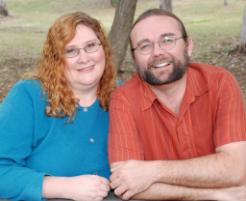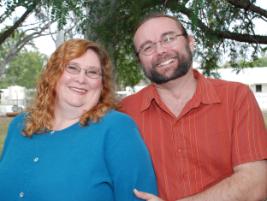2 heads better than 1 when it comes to safety
Published on 28 August, 2007

CQU's Lisa Bricknell and her partner Dale Trott are dedicated to training up safety professionals.A Central Queensland couple is hoping to change the perception of public and employee health by training up professionals for the industry.
From investigating the biodegradation of pesticides in mangrove sediments to researching the management of fungal toxins in Australian maize crops, Central Queensland University's Lisa Bricknell has a wealth of experience in the buzz area of environmental health.
She has worked in both state and local government for more than 11 years and was involved in a Cabinet-funded joint research project designing a management system for environmental health hazards in government premises.
Originally from Brisbane and after a year stint in Blackwater, she moved to Rockhampton back in 1993 to work for Queensland Health. Now calling Rocky home, she has spent the last 6 months working at CQU's Rockhampton campus lecturing in Occupational, Health and Safety (OH&S), alongside her partner, Dale Trott. Mr Trott is also a lecturer in OH&S and last year was announced as CQU's Early Career Academic of the Year.
The pair both exude a passion for the well-being of employees and the public in general.
Ms Bricknell will next year head up a new program for CQU, the Bachelor of Environmental Health. The program has been designed due to the high demand for environmental health officers (EHOs) in government and private enterprises throughout regional Queensland.
Both the Australian Institute of Environmental Health and the Wide Bay Burnett Regional Organisation of Councils have directly approached CQU to develop a program to meet the demand for qualified EHOs.
Both groups have raised concerns about the small number of professionals expected to graduate in coming years and the need for an externally available program in Queensland.

Lisa and Dale enjoy the challenge of training health and safety professionals."I'm really excited about this. Developing and coordinating an environmental health degree is something I've wanted to do for many years now. It's a fascinating field - it requires a real mix of skills in science, health, problem solving, law and even some detective work," Ms Bricknell explained.
The program will incorporate courses in water quality management, environmental science, microbiology, disease control, food safety and environmental toxicology as well as in law, OHS and health promotion.
"Most graduates of the program will find work in local and state government - primarily enforcing legislation, public health planning, community education and investigation. There are also positions available in the military, particularly the army and air force."
Some of the more exciting work that EH practitioners can be involved in is in the field of disaster management and international aid. EH practitioners have skills in disease control and are often in the first wave of response during a disaster such as the Boxing Day tsunami.
Ms Bricknell said the employment growth for both environmental and occupational health and safety professionals to 2011 is expected to remain strong.
"I think it's very important for OHS and EHO professionals to realise that these areas are still developing concepts," Ms Bricknell explained.
"Change occurs slowly and it's unreasonable to expect a safety culture to occur overnight. But there has been a strong commitment to safety by government and industry in recent times and safety professionals have made a remarkable contribution."
CQU graduates of the Environmental Health degree will be recognised to work in the UK and in New Zealand. The Australian Institute of Environmental Health will accredit the course and has mutual recognition agreements in both countries.

